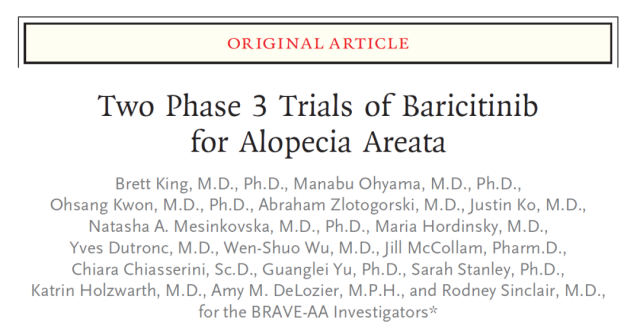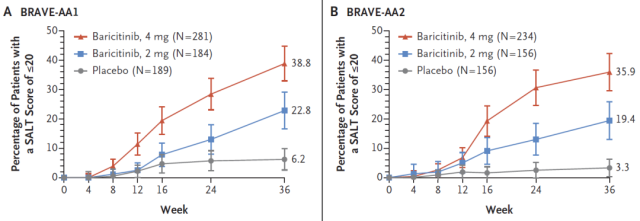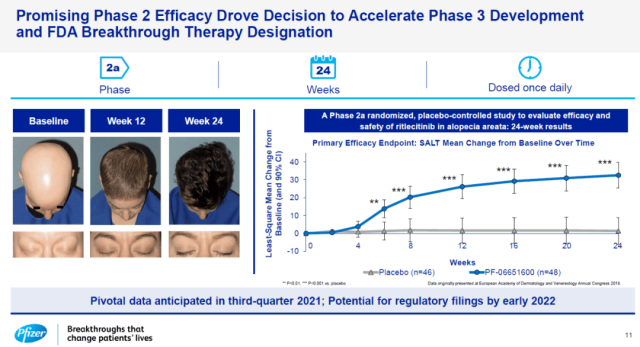Phase 3 clinical trials of Eli Lilly’s alopecia areata drug is outstanding
- Normal Liver Cells Found to Promote Cancer Metastasis to the Liver
- Nearly 80% Complete Remission: Breakthrough in ADC Anti-Tumor Treatment
- Vaccination Against Common Diseases May Prevent Dementia!
- New Alzheimer’s Disease (AD) Diagnosis and Staging Criteria
- Breakthrough in Alzheimer’s Disease: New Nasal Spray Halts Cognitive Decline by Targeting Toxic Protein
- Can the Tap Water at the Paris Olympics be Drunk Directly?
- Should China be held legally responsible for the US’s $18 trillion COVID losses?
- CT Radiation Exposure Linked to Blood Cancer in Children and Adolescents
- FDA has mandated a top-level black box warning for all marketed CAR-T therapies
- Can people with high blood pressure eat peanuts?
- What is the difference between dopamine and dobutamine?
- How long can the patient live after heart stent surgery?
NEJM Heavyweight: Phase 3 clinical trials of Eli Lilly’s alopecia areata drug is outstanding. Nearly 40% of patients recover 80% of their hair.
Alopecia areata , an autoimmune disease characterized by patchy hair loss, is the second most common hair loss symptom globally, after androgenic alopecia. Alopecia areata is partial or complete loss of hair on the scalp, face, or other parts of the body caused by immune cells attacking healthy hair follicles.
The average age of onset of alopecia areata is between the ages of 25 and 35, but it can also affect older adults, children, and teens, and is seen in both sexes and all races.
Alopecia areata is associated with poor health-related quality of life in many patients who may suffer from severe psychological disorders, including depression and anxiety. However, to date there is no FDA-approved drug or therapy for alopecia areata.
On March 26, 2022, the New England Journal of Medicine (NEJM) published a clinical trial paper titled: Two Phase 3 Trials of Baricitinib for Alopecia Areata .
The paper presents the results of two Phase 3 clinical trials for the treatment of severe alopecia areata designed to validate the efficacy and safety of the oral JAK inhibitor Baricitinib , developed by Eli Lilly / Incyte , in the treatment of severe alopecia areata.
The results showed that in the 36th week after treatment, nearly 40% of the patients in the 4mg dose group had reduced hair loss from an average of more than 85% to less than 20%. That is, nearly 40% of patients recover 80% of their hair.

The research team conducted two randomized, placebo-controlled Phase 3 clinical trials, BRAVE-AA1 and BRAVE-AA2 , with 654 patients in the former and 546 patients in the latter. The participants were adults with severe alopecia areata, with alopecia areata and alopecia scores ranging from 50 to 100 (average 85.5) .
That is to say , the hair of these patients is less than 15% on average . Patients received 4 mg of baricitinib per day, 2 mg of baricitinib per day, and placebo.
At 36 weeks of treatment, the scores of alopecia areata and alopecia were assessed in both groups.
In the BRAVE-AA1 group, the proportion of patients with alopecia areata and alopecia score less than 20 was 38.8% in the 4 mg dose of patients, and the proportion of patients in the 2 mg dose of patients with alopecia areata and alopecia score less than 20 was 22.8%, and in the placebo group Only 6.2%.
Data in the BRAVE-AA2 arm were 35.9% (4 mg dose treated) , 19.4% (2 mg dose treated) and 3.3% (placebo) .

In the BRAVE-AA1 arm, the difference between 4 mg baricitinib treatment and placebo was 32.6%, and the difference between 2 mg baricitinib treatment and placebo was 16.6%. In the BRAVE-AA2 group, the corresponding differences were 32.6% and 16.1%.
These two phase 3 clinical data show that 4mg Baricitinib treatment can restore the hair of nearly 40% of patients with severe alopecia areata to a state of more than 80% , and the effect is significant.
Common side effects of baricitinib treatment compared with placebo were acne, increased creatine kinase levels, and increased low-density and high-density lipoprotein cholesterol levels.
Prior to this, on August 4, 2021, Pfizer announced that its small molecule drug Ritlecitinib for the treatment of alopecia areata received positive top-line results in a Phase 2b/3 clinical trial.
In this Phase 2b/3 clinical trial, both 30mg and 50mg doses of Ritlecitinib met the primary efficacy endpoint of improving scalp hair regrowth .
After 6 months of treatment, the proportion of patients with scalp hair loss ≤ 20% was significantly higher than that in the placebo group.
In this randomized, placebo-controlled, double-blind clinical trial, a total of 718 patients with alopecia areata aged 12 years and older participated, and these patients with alopecia areata had more than 50% scalp hair loss and had symptoms of alopecia areata for at least six months.
Patients were randomly assigned to four groups, Ritlecitinib 50mg, 30mg, 10mg, and placebo.
The primary endpoint was based on the proportion of patients with scalp hair loss ≤20% at week 24.
Both the 30mg and 50mg doses of Ritlecitinib met the primary efficacy endpoint of improving scalp hair regrowth.

Ritlecitinib , a JAK3/TEC inhibitor developed by Pfizer, inhibits signaling of IL-15 and CD8 cytokines, two important factors that drive the immune system to kill hair follicle cells.
Ritlecitini has achieved remarkable results in the previous Phase 2 clinical trial and has been granted a breakthrough therapy designation by the FDA.
The innovative therapy has now started clinical research in China. The therapy is also being studied in vitiligo, rheumatoid arthritis, Crohn’s disease and ulcerative colitis.
References :
https://www.nejm.org/doi/full/10.1056/NEJMoa2110343?query=featured_home
https://www.pfizer.com/news/press-release/press-release-detail/pfizer-announces-positive-top-line-results-phase-2b3-trial
NEJM Heavyweight: Phase 3 clinical trials of Eli Lilly’s alopecia areata drug is outstanding. Nearly 40% of patients recover 80% of their hair.
(source:internet, reference only)
Disclaimer of medicaltrend.org
Important Note: The information provided is for informational purposes only and should not be considered as medical advice.



